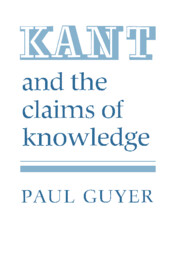Book contents
- Frontmatter
- Contents
- Acknowledgments
- Note on sources
- Introduction
- Part I Kant's early view
- Part II The transcendental deduction from 1781 to 1787
- Part III The principles of empirical knowledge
- 6 The schematism and system of principles
- 7 Axioms and anticipations
- 8 The general principle of the analogies
- 9 The first analogy: substance
- 10 The second analogy: causation
- 11 The third analogy: interaction
- Part IV The refutation of idealism
- Part V Transcendental idealism
- Afterword
- Notes
- Index of passages cited
- General index
8 - The general principle of the analogies
Published online by Cambridge University Press: 09 March 2010
- Frontmatter
- Contents
- Acknowledgments
- Note on sources
- Introduction
- Part I Kant's early view
- Part II The transcendental deduction from 1781 to 1787
- Part III The principles of empirical knowledge
- 6 The schematism and system of principles
- 7 Axioms and anticipations
- 8 The general principle of the analogies
- 9 The first analogy: substance
- 10 The second analogy: causation
- 11 The third analogy: interaction
- Part IV The refutation of idealism
- Part V Transcendental idealism
- Afterword
- Notes
- Index of passages cited
- General index
Summary
The analogies of experience, in the Critique of Pure Reason, are the heirs to the analogies of appearance which constituted Kant's original transcendental theory of experience. The analogies of experience thus constitute both the historical and philosophical heart of Kant's theoretical philosophy as that existed prior to 1787 – prior, that is, to Kant's addition of his ultimate argument for the objective validity of the categories of the understanding in the form of his refutation of idealism. Seen from this ultimate perspective, the analogies are an indispensable but also incomplete part of an epistemological theory of the necessary conditions of timedetermination. They show us that certain principles are required in order to ground temporal determinations about objects. But they assume that we can and must make such determinations, and it is only in the refutation of idealism that Kant attempts to defend this assumption by showing that temporal determinations about objects distinct from our own representations of them are themselves necessary conditions of the temporal determinations of our own representations considered merely as such. In other words (to return to the strategic terms used in the discussion of the transcendental deduction), the analogies of experience might seem to suffice for an answer to an empiricist, who supposes that we can make objective judgments about objects in time but without the benefit of any a priori concepts or principles; however, the conclusions of the analogies could not be forced on a skeptic (such as Hume on causation) who is also willing to doubt that we have knowledge of external reality at all.
- Type
- Chapter
- Information
- Kant and the Claims of Knowledge , pp. 207 - 214Publisher: Cambridge University PressPrint publication year: 1987



